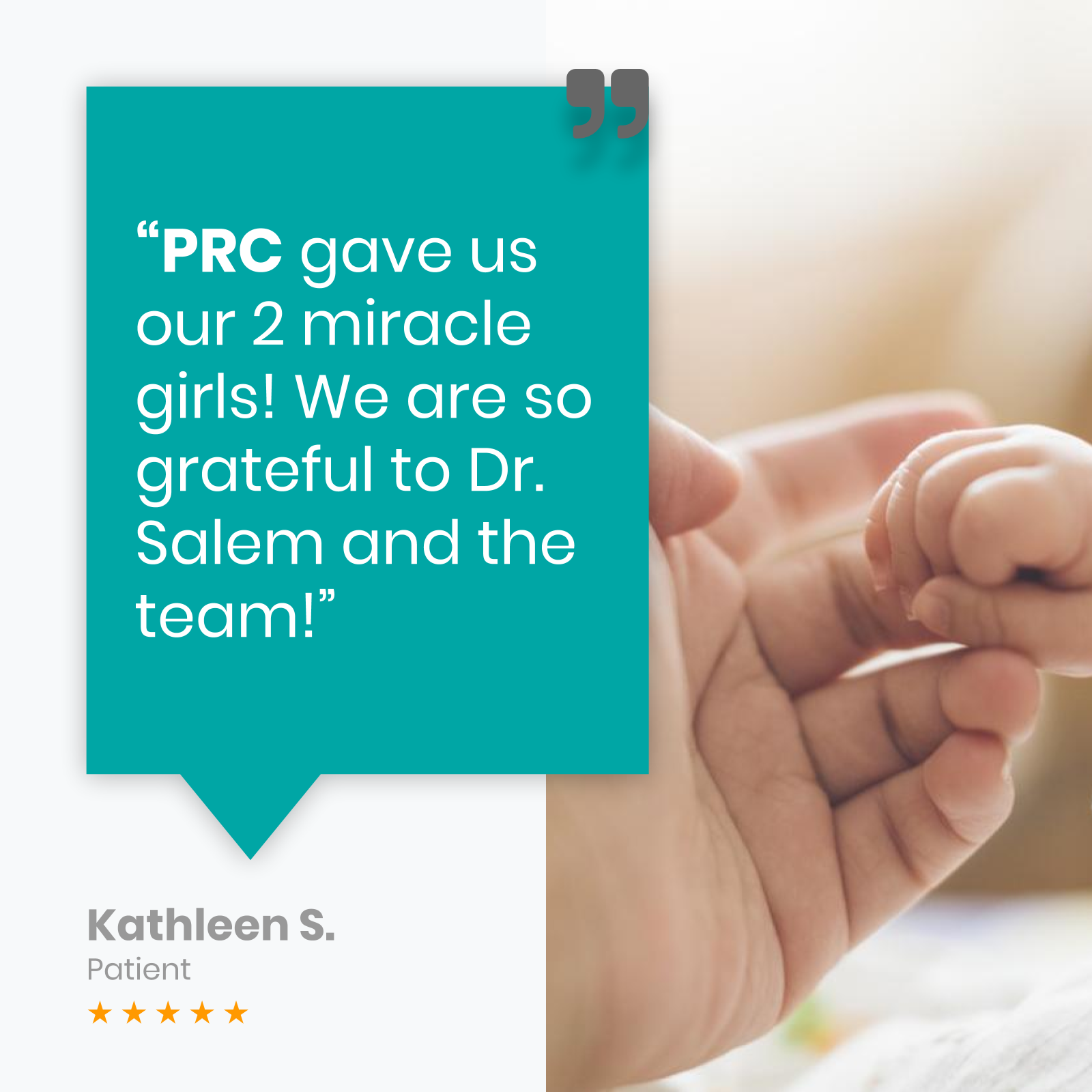Frozen Embryo Transfer
Frozen Embryo Transfer in Southern California
Frozen embryo transfer helps prospective parents achieve high pregnancy rates and minimal complications compared with a fresh embryo transfer. Here’s what you need to know about frozen embryo transfer.
One of the treatments offering the best chance of success for a diverse population of patients is commonly known as FET, or frozen embryo transfer. This approach is the process of extracting mature eggs from the patient or donor, initiating fertilization using the potential parent’s or donor’s sperm, monitoring the eggs while they develop into embryos, and then proceeding with cryopreservation. When the patient is ready to attempt pregnancy, the embryos are thawed and transferred to the patient or surrogate.
When Is Frozen Embryo Transfer Used?
Frozen embryo transfer is used by patients undergoing preimplantation genetic testing (PGT). The cryopreservation process safely preserves the embryos while the results of the different tests are determined. Additionally, patients attempting pregnancy using in vitro fertilization (IVF) typically fertilize multiple eggs to ensure the highest probability of success. It is also an option for parents who want to ensure fertility if they choose to grow their families in the future. Additional patients who opt for frozen embryo transfer in Southern California include:
- Potential parents who are undergoing cancer treatment.
- Potential parents who are undergoing treatment that could affect future reproductive health.
- Potential parents in the LGBTQ community.
What Are the Benefits of Frozen Embryo Transfer?
If the patient intends to carry the pregnancy herself (rather than use a surrogate), delaying the transfer of the embryo has several medical benefits. It allows for hormone production to normalize and the uterus to recover after the IVF cycle. The delay optimizes the chances of successful implantation and pregnancy and reduces the risk of ovarian hyperstimulation syndrome (OHSS), which can cause severe discomfort and lead to potential complications.
Frozen embryo transfer success rates can vary significantly depending on the patient’s age and other factors, but for patients under the age of 35, the success rates are as high as 60%.
Is Frozen Embryo Transfer Right for Me?
Your particular circumstances will dictate whether frozen embryo transfer will yield the best outcomes. Some patients benefit from initiating a fresh transfer, while delay might be the optimal solution for others.
Your age could also be a factor. Successful pregnancies using frozen embryo transfer are related more to the age of the eggs used to create the embryos than to the parent’s age carrying the pregnancy. Success rates are the highest when the eggs used for fertilization are retrieved from patients under 35.
In many cases, assisted hatching can help mitigate the risk of failure in older patients. Assisted hatching involves the preimplantation rupture of the zona pellucida, a firm layer of cells surrounding the embryo. This procedure helps the embryo attach to the wall of the uterus.
What Is the Frozen Embryo Transfer Process Step by Step?
The frozen embryo transfer timeline typically takes eight weeks. Preparing for frozen embryo transfer begins with administering hormone medications to prepare the endometrium and increase the chances of embryo attachment. During the process, your blood will be tested to measure hormone levels, and you will be given a transvaginal ultrasound exam to assess the condition of your reproductive organs.
When the examinations show that the endometrial lining is appropriately thick and the hormone levels are correct, your team will then schedule the frozen embryo transfer due date, which will be several days from the assessment.
How Long After Egg Retrieval is Frozen Embryo Transfer?
Your physician will work with you to determine the optimum timeline for your frozen embryo transfer.
At Pacific Reproductive Center, we have helped a broad spectrum of patients achieve successful pregnancies using frozen embryo transfer as a part of their personalized reproductive treatment plans. We are incredibly proud to offer on-site lab services for IVF, preimplantation genetic screening, and cryopreservation. Our high success rates are due, in large part, to our ability to execute delicate laboratory processes immediately without risking complications due to transportation delays. We will be more than happy to discuss your optimal fertility treatments during your consultation.
During your comprehensive consultation, we will discuss the fee structure for your fertility treatment options. The package fee for frozen embryo transfer includes the following:
- Office visits and ultrasound.
- Lab tests (all routine labs through two pregnancy tests).
- Thawing and processing of the embryo(s).
- Embryo transfer.
- Assisted hatching.
We will also review any risks you are likely to experience due to your unique medical circumstances. In many cases, the risks for frozen embryo transfer might be lower than those commonly associated with fresh-cycle embryo transfer.
If you’re ready to start or grow your family, please don’t hesitate to contact the team at our fertility clinic in California to help you begin your journey and answer any questions you might have about frozen embryo transfer in Southern California.
Treatments
Pacific Reproductive Center has been successfully aiding conception for over two decades. We optimize the conditions of fertility treatment to give every potential parent the greatest chance of successful childbirth.
Resources
We ensure that every patient fully understands their medical condition and treatment options available to them. We understand each patient is unique so we help guide you through the best option to support your own fertility journey.
Looking for the Best Fertility Clinic in Southern California?
Pacific Reproductive Center has four convenient locations throughout Southern California, making it easy for patients to receive quality care close to home. Each IVF fertility center has an on-site lab, next-generation services, and state-of-the-art equipment.
Whether in Glendale, Torrance, Irvine, or Corona, our world-class fertility doctors can help you build the family you’ve always wanted.
3720 Lomita Blvd, Suite 200 Torrance, CA 90505
116 E. Broadway, Suite 300 Glendale, CA 91205
10 Post Irvine, CA 92618
381 Corporate Terrace Corona, CA 92879




